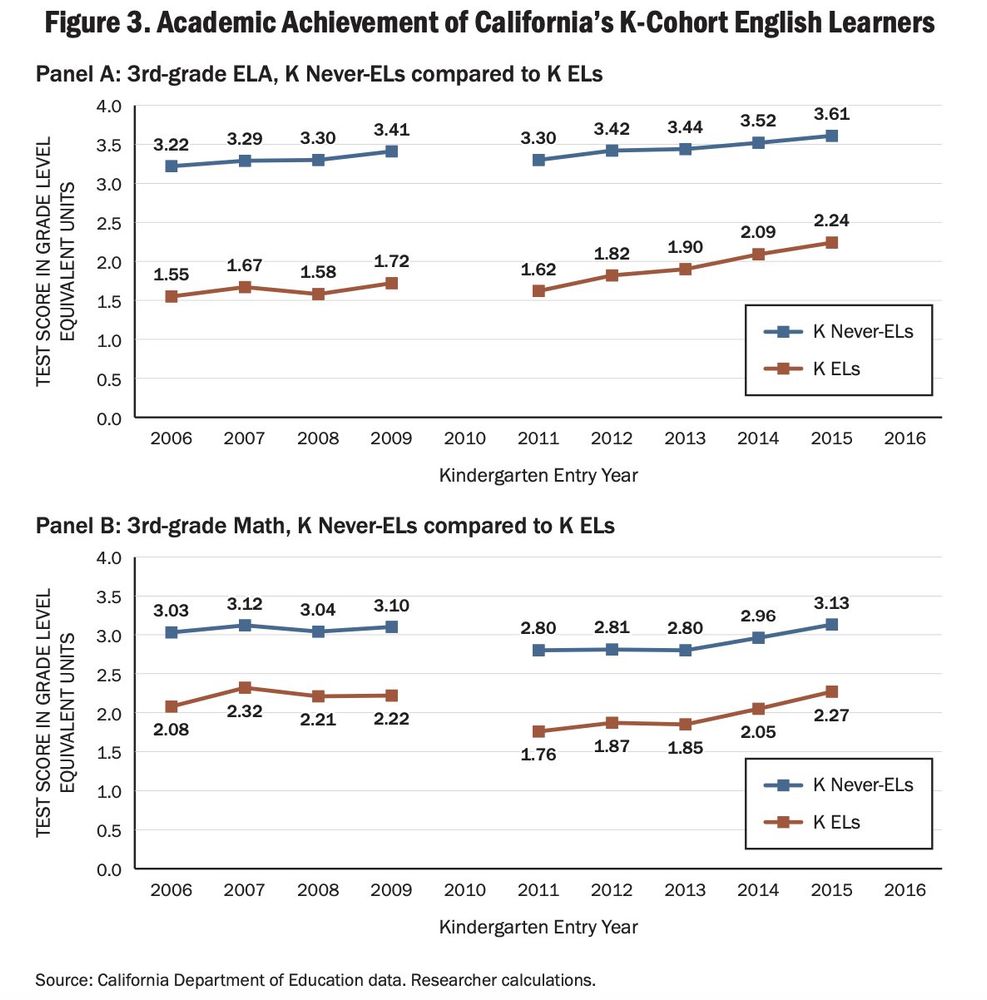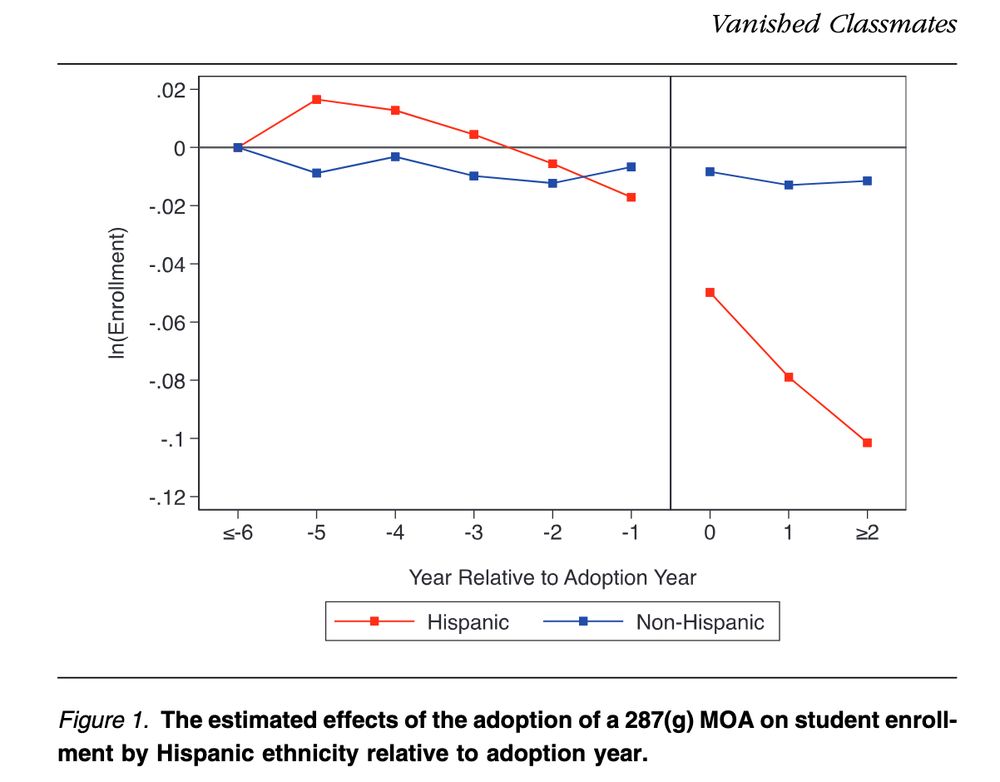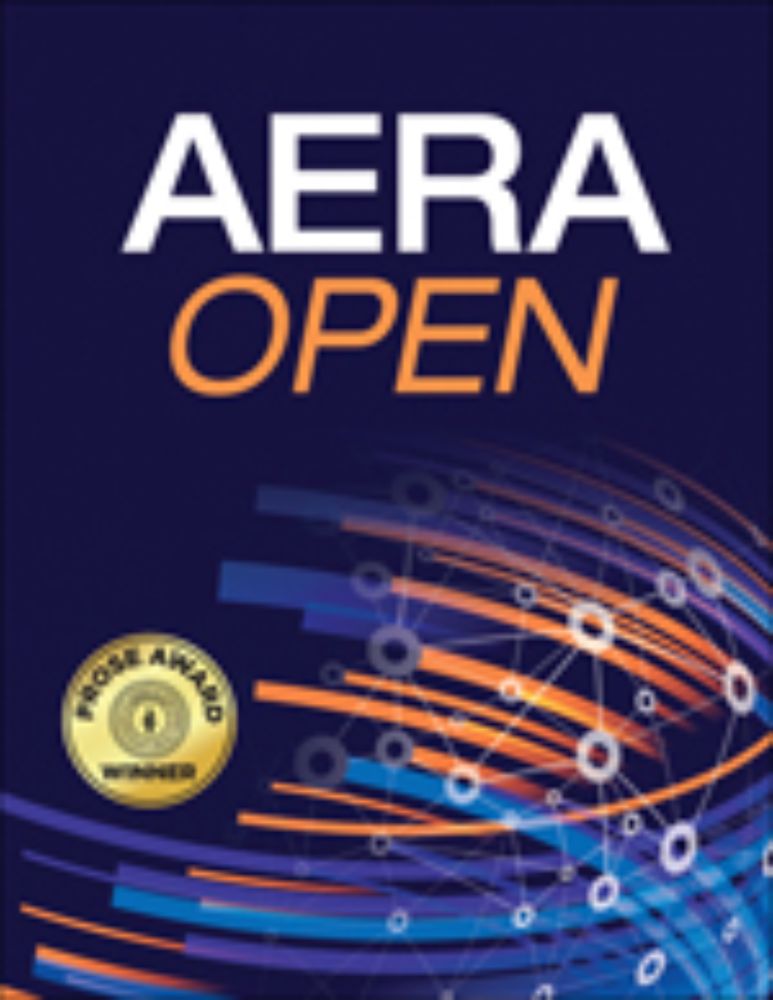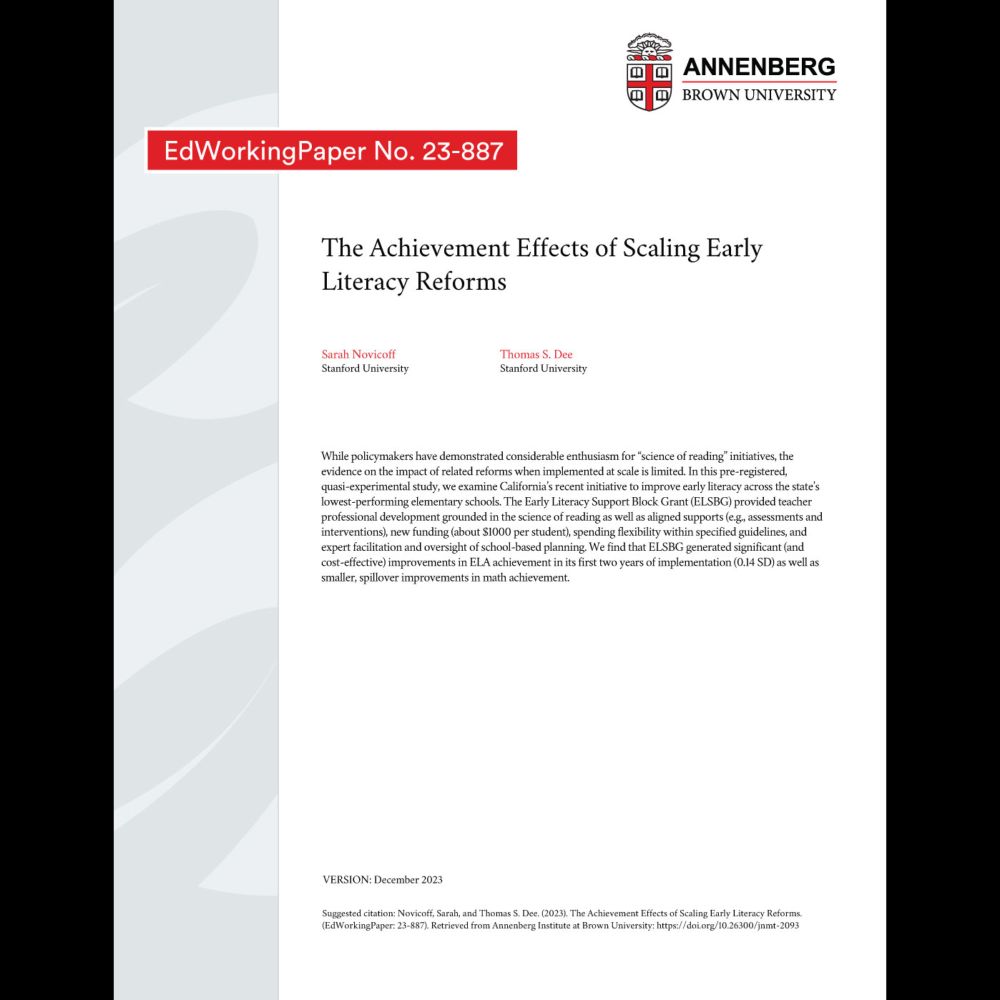Getting ready for #AEFP2025 and starting to think about what panels to see? Want to learn more about the implementation details of science of reading reforms? Come see me present about the role of autonomy in literacy policy in session 7.03!
@aefpweb.bsky.social
06.03.2025 22:41 — 👍 4 🔁 1 💬 0 📌 0
Read my new article for some striking descriptive facts about California's English learners, including:
- The achievement gap for ELs in ELA shrunk by 20% 2006-15
- 3/4 of ELs who start in kinder. are proficient in English by grade-5
- 1/2 of ELs who start in kinder. are reclassified by grade-5
03.03.2025 17:17 — 👍 1 🔁 0 💬 1 📌 0
Open Postdoctoral position, faculty mentor Susanna Loeb | Office of Postdoctoral Affairs
POSTDOC ALERT!
Working with Susanna Loeb and the SCALE (Systems Change for Advancing Learning and Equity) Initiative at Stanford has been one of the highlights of my grad school experience. Come join our amazing team in a postdoc role next year 😀 Learn more here: lnkd.in/ge_iS7XC
20.11.2024 23:12 — 👍 2 🔁 0 💬 0 📌 0
Thanks to my amazing co-authors Sean Reardon and Rucker Johnson for their mentorship in this work and to the phenomenal team at LPI for their support of this work. Read the full report here learningpolicyinstitute.org/media/4403/d...
19.11.2024 21:40 — 👍 2 🔁 0 💬 0 📌 0
4) We also follow one cohort’s journey from K all the way to grade-8. We observe only 48.5% of students who started as English Learners in kindergarten had been reclassified by the end of grade-5 (‼️)and 73.1% were reclassified by the end of grade-8.
19.11.2024 21:40 — 👍 1 🔁 0 💬 1 📌 0
3) In the most recent cohort who we can observe finish grade-5, though 72% of K-cohort EL students were designated as English proficient by the end of 5th grade and thus were eligible for reclassification based on that criterion, barely 50% were actually reclassified.
19.11.2024 21:40 — 👍 1 🔁 0 💬 1 📌 0
2) More recent cohorts reached English proficiency in earlier grades than previous cohorts had. But, we see almost no change in the overall share who were proficient in English by the end of grade-5. (Note these cohorts began school before some of these reforms were complete).
19.11.2024 21:40 — 👍 1 🔁 0 💬 1 📌 0

This figure has two panels. The top figure shows changes in grade-3 English Language Arts achievement for the kindergarten cohorts of 2006 to 2016. It shows that achievement gaps have narrowed between students classified as English Learners in kindergarten and students who were not classified as such. A similar pattern appears in the second panel about math achievement, although the gap is smaller and also shrinks less.
1) English Learner academic achievement by 3rd grade has improved over time, shrinking the achievement gaps between K-cohort ELs and other students in English language arts (ELA) and math. See figure below.
19.11.2024 21:40 — 👍 1 🔁 0 💬 1 📌 0
📚California’s K-12 policies towards English Learners have changed A LOT in the last two decades (e.g., a new funding system, new instructional materials requirements). So, how have English Learner outcomes changed over that same time period?
19.11.2024 21:40 — 👍 2 🔁 2 💬 2 📌 0

Event-study showing impact of 287(g) agreements on Hispanic & non-Hispanic enrollment
Sadly apt to re-up evidence on immigration enforcement's impact on students & schools
Dee, T. & Murphy, M. (2020). Vanished classmates: The effects of local immigration enforcement on student enrollment. American Educational Research Journal 57(2), 694-727.
Ungated files.eric.ed.gov/fulltext/EJ1...
08.11.2024 22:59 — 👍 24 🔁 19 💬 0 📌 1
Thank you!
18.11.2024 04:38 — 👍 1 🔁 0 💬 0 📌 0
Thanks for making this list! I’d love to be included, if there’s room.
18.11.2024 04:35 — 👍 1 🔁 0 💬 1 📌 0
I’d like to be added to this list please!
11.11.2024 18:53 — 👍 0 🔁 0 💬 1 📌 0
To read more, see @matthewakraft.bsky.social's excellent thread on X or Kevin Mahnken's great coverage in @the74.bsky.social this morning. Or, read the article yourself here journals.sagepub.com/doi/10.3102/... or open-access here edworkingpapers.com/ai22-653.
10.06.2024 16:04 — 👍 0 🔁 0 💬 0 📌 0
My big takeaway: Because time affects achievement, we ought to be really careful about interrupting it (e.g., with intercom announcements) or re-structuring it (e.g., four-day school weeks). We also ought to focus on helping kids capture it (e.g., reducing absenteeism).
10.06.2024 16:03 — 👍 0 🔁 0 💬 1 📌 0
When we consider inputs into schooling, we often think about teachers and funding (which undoubtedly matter a lot!) But, IMHO we don't spend enough time thinking about how long kids are in school & the consequences of that choice. Our research shows that time affects achievement.
10.06.2024 16:03 — 👍 1 🔁 0 💬 1 📌 0
⏰Did you know that students in TX, NE, AR, MS, and AL attend 1.4 more years of school over a K-12 education than students in HI, NV, ME, OR, and RI? ‼️ In a new AERJ article, @matthewakraft.bsky.social and I document differences in time and show how much they matter.
10.06.2024 16:03 — 👍 5 🔁 2 💬 1 📌 0
Want to learn more about this successful program and specifically hear what its outcomes looked like in Oakland? Join me and the Oakland Literacy Coalition for a virtual event on Jan. 17. RSVP for the link here: bit.ly/Jan17forum
03.01.2024 00:42 — 👍 0 🔁 0 💬 0 📌 0
When we compare targeted schools to similar CA elementary schools, targeted schools did 0.14 SD better on ELA tests after 2 years. This wasn’t just a mean difference either. It holds at every part of the distribution. Oh and it improved math scores too!
04.12.2023 16:40 — 👍 1 🔁 0 💬 1 📌 0
So what happened? While most schools nationwide suffered big dips in academic achievement post-pandemic with even bigger losses for already low-performing schools, these targeted schools didn’t.
04.12.2023 16:40 — 👍 0 🔁 0 💬 1 📌 0
In response to a lawsuit, CA rolled out a big intervention. Targeted schools got 4 notable things:
1. Trainings in science of reading
2. More funding (~$1000/student)
3. Support, oversight from experts
4. Flexibility to spend w/in pre-defined categories
04.12.2023 16:39 — 👍 0 🔁 0 💬 1 📌 0
Let’s go back to 2019, before the pandemic and before this program. Reading scores in CA presented a tough reality. Only 49 pct of 3rd graders met or exceeded the ELA standard. In the 76 lowest performing schools, it was 12 pct.
04.12.2023 16:39 — 👍 0 🔁 0 💬 1 📌 0
What happened when CA rolled out a science of reading intervention in its lowest performing schools during a pandemic? The program led to significant improvements in ELA scores!
Read below to learn more about this new research from me and @tomdee.bsky.social
04.12.2023 16:39 — 👍 9 🔁 3 💬 1 📌 1
Econ PhD Candidate at Boston University
Econ History | Education | Labor | Social Insurance
2025 Spencer/NAED Dissertation Fellow
Council of Economics Advisers alum 2024
Raised in Alabama
https://daniellecgw.github.io/
Education policy researcher studying strategies for system improvement that improve student outcomes. Mom to humans and dogs. Swimming, water polo, hiking, and cooking to relax. My posts are my opinions and interests.
We research bold ideas to reshape K-12 education in the United States. Part of ASU’s Mary Lou Fulton College.
Find us here, on X (for now), on LinkedIn, and at crpe.org.
Ex-NPR. Words: New York, Grist, NatGeo, more. New Narratives Fellow, EHRP. Books: Generation Debt, DIY U, The Art of Screen Time, The Test, The Stolen Year. thegoldenhour.substack.com
President of the Fordham Institute, executive editor of Education Next, proud father.
bilingual public school teacher. writing book on synergies btwn cog literacy research & critical/culturally sustaining pedagogies. #LessDoomscrollingMoreAction #NoArmsToIsrael #StopCopCity. callielowenstein.com
uchicago econ ‘21 → RA @ BU WEPC → Phd Student @ Stanford Econ of Ed
K-12 ed lead at Urban Institute. Georgia Policy Labs founding senior director. RPPs, integrated data, veggie grower, and mama, too.
SWDC Parent, Ed Researcher, Lover of Graphs, #DCStatehood, 🐺 🏃🏻♀️ 🚴♀️. Re-posts != endorsements and posts are my own. https://betsyjwolf.substack.com
Special education systems improvement specialist @WestEd.org • Former teacher • Research and support focused on policy/law, literacy, assessment • Nuance embracer • Views are my own
Sociologist researching organizational transitions in education and the labor market. Focus on school district leadership and politics. Postdoc at Brown PSTC & Annenberg Institute. On the job market in Fall 2025. http://greermellon.com
phd student @UCIeducation | interested in ece and sped policy | former k-2 sped teacher | @vanderbiltu @unlv alum | he/him 🏳🌈
Professor of Economics at the University of Texas at Austin and Former Member of Obama's Council of Economic Advisers, animal-lover. Health Insurance is a human right. Poverty is a policy choice.
PhD Candidate in Economics at the UiS School of Business and Law. Researching leadership behaviors.
Synapse Lab UiS - https://www.uis.no/en/synapselab
More about me: https://www.uis.no/en/profile/jon-sander-amland
An education policy research center at USC Rossier focused on research-practice partnerships in Southern California. https://rossier.usc.edu/usc-edpolicy-hub
I am an Economist leveraging the assignment mechanism in the field to test theory and help non-profits, govts, and anyone who will listen! My goal is to (hopefully!) change the world for the better. My picture is with my son who makes me so proud daily.
PACE is an independent, nonpartisan education policy research center based at Stanford, UC Davis, USC, UCLA, and UC Berkeley / https://edpolicyinca.org | Free newsletter: http://edpolicyinca.org/newsletter



